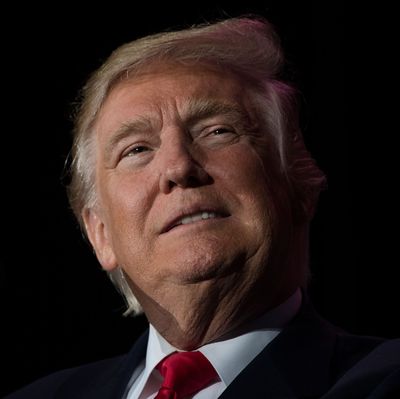
Donald Trump will become the president of the United States next month because he won 80,000 more votes than Hillary Clinton did in three Midwestern states. Eighty thousand votes, in an election where 130 million ballots were cast — and where Clinton can lay claim to 2.8 million more of them than her opponent.
The contingency of Trump’s victory is unbearable for his detractors. When history reveals itself to be a game of inches, one becomes acutely aware of how many different ways defeat could have been averted: had James Comey not sent that letter; had the Clinton campaign not sent her to Arizona; had Access Hollywood sat on that tape for a couple weeks more.
But the defeated aren’t the only ones who find this contingency unbearable: The president-elect has spent much of the past month telling bald-faced lies about the immense size — and, thus, the inevitability — of his electoral triumph.
Trump has described his election as “one of the great victories of all time,” a “historic electoral landslide,” and a “massive landslide victory.” When the Electoral College ratified his win on Monday, Trump thanked the American people “for their overwhelming vote.”
There is no sense in which this is true. Even if one ignores the popular vote — and the narrow margins by which Trump secured his Electoral College majority — the president-elect still lays claim to only the 46th-largest Electoral College margin in American history.
But Trump has spent much of the past month disputing this fact, along with any other that undermines the righteousness of his claim to power.
Clinton’s popular-vote advantage? Supplied entirely by illegal immigrants.
A hostile foreign power may have bolstered his candidacy? You can’t trust anything the American intelligence community tells you.
On Wednesday, Trump sought, once again, to dispute the legitimacy of Clinton’s claim to a popular-vote win.
Here, the president-elect makes his case in uncharacteristically rational terms. Considering Trump’s historic unpopularity — particularly among demographic groups that are underrepresented in swing states — it seems highly improbable that Trump would have won the popular vote, had both candidates campaigned with that goal in mind. But it is not wholly implausible. And the same can be said for a world in which Trump spent as much on his campaign as Clinton did on hers.
But one phrase still tips over into the Orwellian: “I would have done better in the election, if that is even possible.”
Trump’s mendacity on this subject is unsettling for many reasons. If he is incapable of accepting the reality of a narrow victory, how might he respond to that of a narrow loss? When the president-elect has so little tolerance for inconvenient truths, how might he use the enormous power of his office to disempower the inconvenient truth-tellers — or to disenfranchise the inconvenient voters?
Trump won plaudits on Election Night for pledging to be the president of “all Americans.” But surely, the bare minimum a president can do to represent a citizen is to acknowledge the reality of her vote. But Trump has resolutely refused to do this for 48 percent of the American electorate.
Meanwhile, Trump’s supporters in right-wing media have dutifully amplified his lies. This week, one Breitbart editor justified his outlet’s commitment to vilifying any Republican that defies Trump’s will by telling Politico, “If any politician in either party veers from what the voters clearly voted for in a landslide election … we stand at the ready to call them out on it and hold them accountable.”
War is Peace. Freedom is Slavery. The Voters Clearly Voted for Trump in a Landslide Election.






























